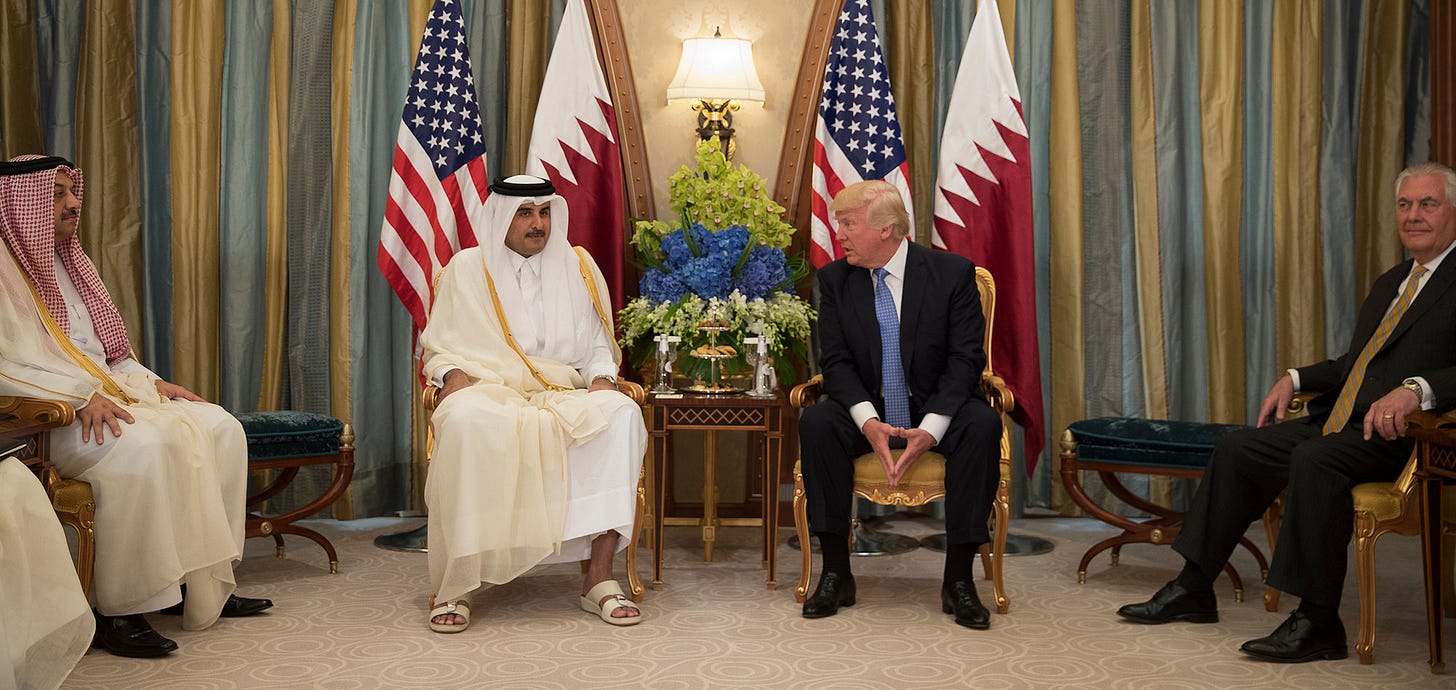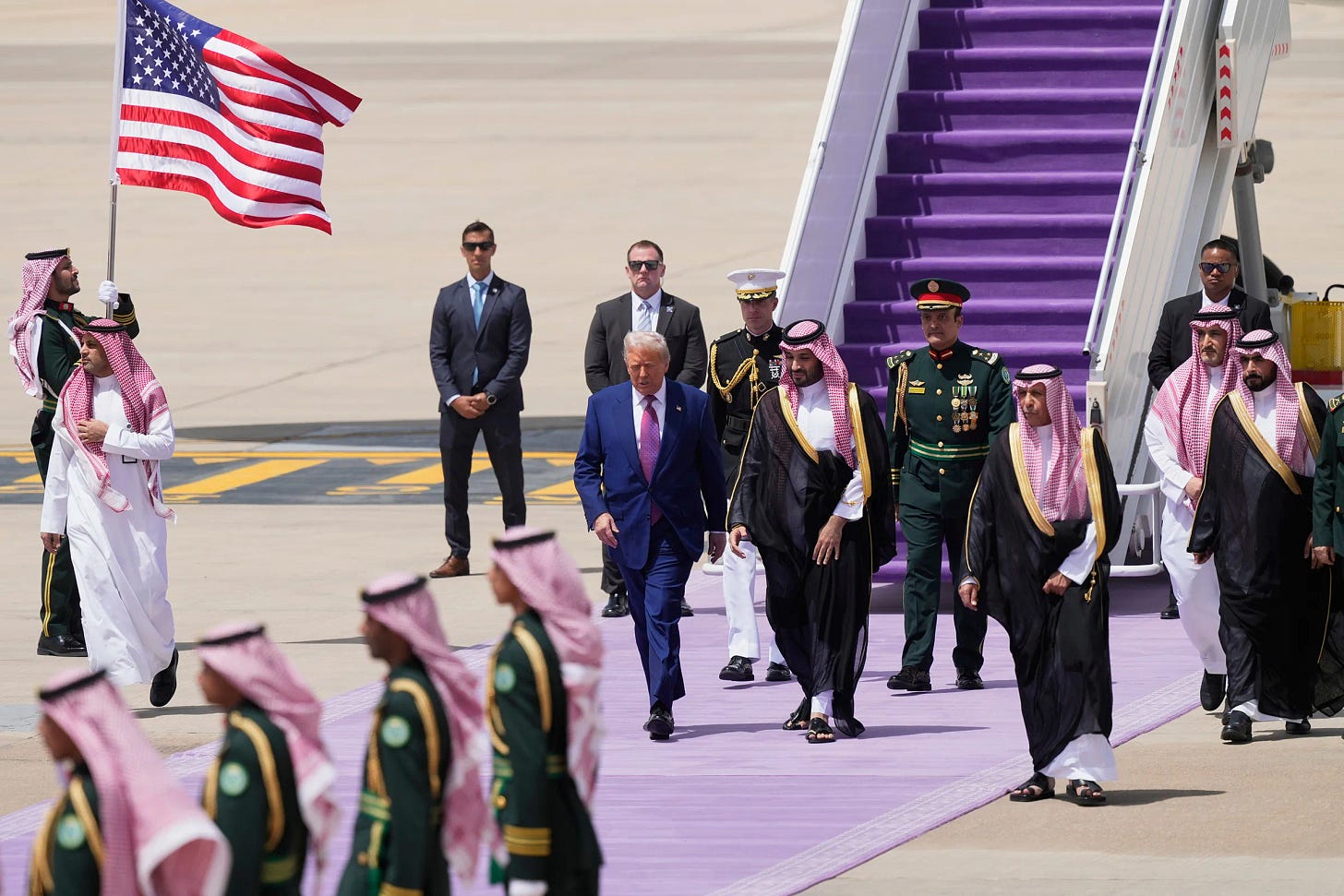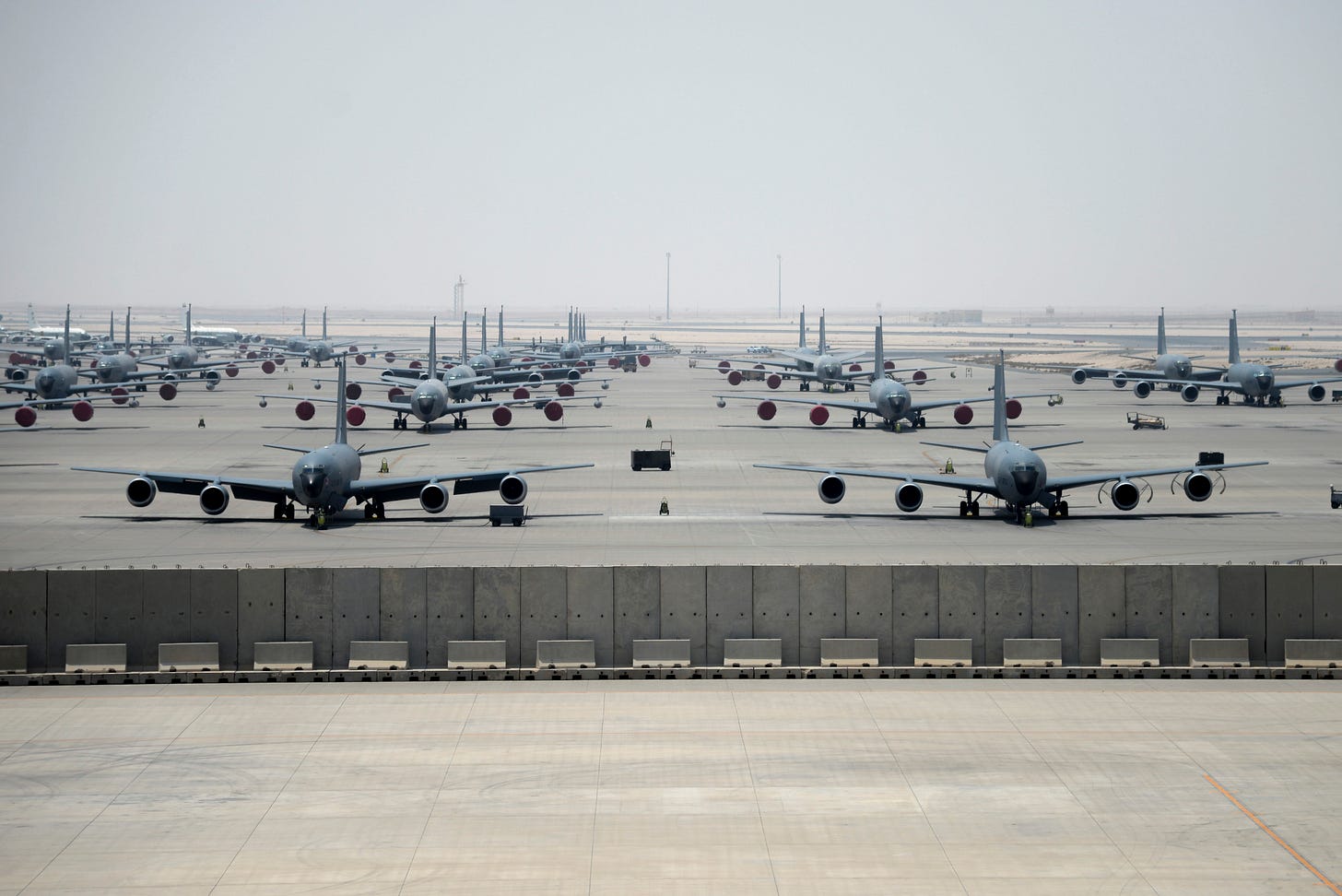Now Accepting Bids: US Foreign Policy
When President Obama visited Saudi Arabia in 2009, his adviser Ben Rhodes received an unexpected gift when he got to his hotel room. "When I opened the door to my unit, I found a large suitcase, and inside were jewels," Rhodes later wrote, adding that all of the officials in the delegation got the same. Diplomatic protocol required returning such lavish presents unless officials paid market value from their own pockets.
Fast-forward to 2025. Before he left for his visit to the Middle East in early May, Qatar offered President Trump a $400 million Boeing 747 — a “palace in the sky” — and Trump declared he'd be “stupid” to refuse it. The plane is nominally being donated to the Department of Defense rather than Trump personally, and may be modified for use as a new Air Force One. But Trump also reportedly plans to transfer the plane to his presidential library after he leaves office so that he can continue to use it.
It's an open secret that Arab leaders have always tried to buy influence in Washington. But what we witnessed during Trump's recent tour of Saudi Arabia, Qatar, and the United Arab Emirates, which was focused on wooing foreign investors to the US, at times looked like an auction of American foreign policy to the highest bidder.
Consider Trump's dramatic announcement in Saudi Arabia that he would lift sanctions that had long been in place on Syria, including a ban on importing oil. Trump even encouraged American companies to invest in the country. The dictatorial Assad regime of Syria, long-accused of state-sponsored terrorism and human rights abuses, ended in December, when the former president, Bashar al-Assad, was overthrown.
“I will be ordering the cessation of sanctions against Syria in order to give them a chance at greatness,” Trump proclaimed in front of a largely Saudi audience. “Oh, what I do for the Crown Prince.” The audience of Saudi business leaders erupted in knowing laughter.
The policy shift caught even Trump’s own administration by surprise. Perhaps it was time to lift the sanctions on Syria — they had been imposed on the previous regime — yet they continued to strangle ordinary Syrians and prevent the new government from rebuilding the country. But the decision wasn't presented as the product of careful strategic deliberation for the betterment of the Syrian people. It was framed as a favor to Saudi Crown Prince Mohammed bin Salman, who is working with other regional leaders to help Syria rebuild and who had just pledged $600 billion in investments in the United States
Days after the sanctions were lifted on Syria, reports emerged that Syria's new leader, Ahmed al-Sharaa — the former militant whose forces had toppled Assad, and who met with Trump in Saudi Arabia — had offered to build a Trump Tower in Damascus and grant Syrian mineral rights to American companies with ties to Trump.
Qatar then made an even bigger gesture to the United States: in addition to the luxury plane, they were prepared to make an unprecedented $1.2 trillion investment in US aviation, defense, and quantum computing firms.
The trip concluded with the UAE announcing a massive deal to buy US chips used in artificial intelligence, something it had previously been barred from doing because of national security restrictions on sales of the chips. The agreement has alarmed both Democrats and Republicans in Congress, who fear the chips could become backdoor access points for China to acquire the technology. The chair of the House Select Committee on the Chinese Communist Party warned that the deal presents "a vulnerability for the CCP to exploit."
At a US–Saudi investment summit, which was attended by scores of top American corporate leaders, including Elon Musk and the CEOs of Nvidia, Google, and BlackRock, Trump praised the US–Saudi relationship as "more powerful than ever before."
He used the speech to backtrack on America’s traditional promotion of democracy and human rights in the region. “The gleaming marvels of Riyadh and Abu Dhabi were not created by the so-called nation-builders… who spent trillions and trillions of dollars failing to develop Kabul, Baghdad, so many other cities,” he said, drawing thunderous applause.
He wasn't entirely wrong about the nation-building disasters in Iraq and Afghanistan — there's plenty to criticize. But replacing idealistic overreach with transactionalism creates its own problems, especially when the administration fails to separate the personal economic interests of Trump and his associates from strategic decisions.
The Trump Organization has projects in Saudi Arabia, Qatar, and the UAE. Eric and Don Jr. have been crisscrossing the region signing deals for golf courses, luxury towers, and cryptocurrency ventures. And a UAE-backed fund announced that it would make a $2 billion investment in a cryptocurrency exchange, using a coin developed by World Liberty Financial. World Liberty is the Trump family's crypto firm that was co-founded with the son of Steve Witkoff, who is Trump’s official envoy to the Middle East.
These monarchs understand Trump in ways that they didn't relate to previous American administrations. These are governments for which the distinction between treasury department and personal bank accounts is nearly non-existent. When Eric Trump announced another Trump-branded tower in Dubai while his father prepared for this state visit, Arab leaders saw nothing scandalous — this is what they do every day.
To be fair, some policy outcomes of Trump's Mideast diplomacy might advance American interests. US firms without ties to Trump will benefit from aspects of the investment deals, and they will create jobs for US workers. Trump's willingness to meet with Syrian President al-Shara, whom he encouraged to make peace with Israel and combat terrorism, shows pragmatic flexibility that could help stabilize the region.
Even Senator Jeanne Shaheen, the top Democrat on the Foreign Relations Committee, applauded this engagement. And when Trump offered Iran what he called an “olive branch” while insisting it could never have nuclear weapons, he was articulating a position that previous administrations struggled to maintain.
It’s absolutely true that the traditional foreign policy playbook hasn't exactly delivered stunning successes in recent years. But when the president's sons are signing real estate deals in the same capitals where their father is conducting diplomacy, when a $400 million jet is treated as just another perk of office, when sanctions are lifted with a wink to personal business opportunities — we're not just changing tactics. We're changing what America represents in the world.
Qatar hosts a US military base, but it has also hosted Hamas’s political leadership for years and given $1.8 billion in financial support to the terrorist organization in Gaza, despite American objections. Now it’s purchasing influence at an unprecedented scale. What will it expect in return?
Gulf monarchs suddenly have reason to see America not as a principled superpower but as a business partner with assets to monetize. As the United States pivots away from promoting democracy and toward making foreign deals that benefit its leaders personally, we risk losing something essential to American leadership: the idea that our foreign policy serves purposes larger than the bank accounts of the powerful and the well-connected.









Can someone whose values are corrupt occasionally do something that benefits the whole? Maybe in the short term, but the long-term will always yield far more harm for the whole. Trump’s value is a love of money - for himself. He is showing so clearly that is his guiding value and what motivates his actions. History (and all of the major religions) warn of the very real and present danger of a person whose only moral is a love of money. He lacks the moral character to lead. I can’t believe all patriotic Americans cannot agree on this.
I am deeply distressed over everything he does, and selling the soul of what truly makes our ideals stand above the rest is a diplomatic bridge too far. I’d rather lose economic advantage than our morality.